Titan Exchange is improving how swaps happen on Solana by sitting one layer above traditional DEX aggregators. While most aggregators pull quotes from individual DEXes, Titan aggregates those aggregators to become a true Meta Aggregator. This structure makes sure users always receive the best possible price by combining multiple DEX aggregators’ outputs and running onchain simulations to make the best possible trades.
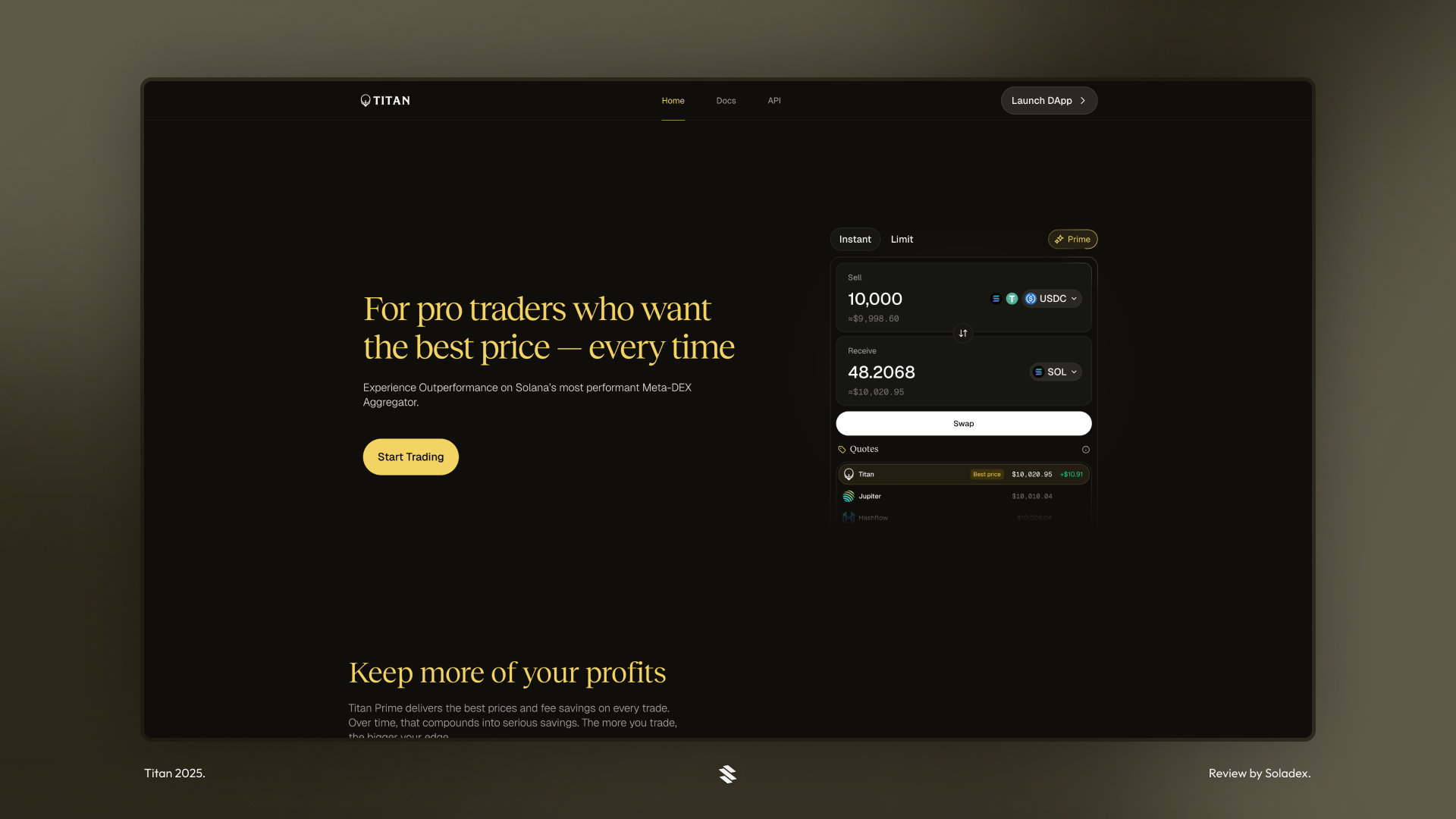
How Swaps Work
A swap is a simple spot trade between two tokens that is executed directly onchain through a user’s wallet. Once the transaction is signed, it propagates the trade globally, and it settles almost instantly. On Solana, these swaps are completed for less than a cent, making Titan’s execution model not only faster but also more efficient than traditional financial systems.
Understanding DEX Aggregators
On Solana, users can swap through centralized exchanges (such as Binance), decentralized exchanges (like Raydium or Orca), or DEX aggregators (like Jupiter and Titan). While DEXes provide liquidity from a single venue, aggregators pull liquidity from multiple sources to provide traders with better pricing. Because Solana’s transaction fees are very low (almost zero), DEX aggregation is possible, and it allows Titan to compute complex trade routes without worrying about high gas costs, unlike on Ethereum.
How Titan Works
Most DEX aggregators on Solana use different algorithms and data sets, so their price quotes often vary. Titan solves this fragmentation by aggregating across all of them. By doing so, it guarantees that users always trade at the most favourable price available on-chain at any given block. Titan simulates every quote directly on the blockchain, meaning it doesn’t rely on external data or old price quotes. Using Titan is as simple as using the common decentralized exchanges on Solana. Connect your wallet (Titan supports all major wallets on Solana). Select the tokens to swap and enteer the amount. Click swap.
Titan’s New Algorithm
Traditionally, DEX aggregators depend on shortest-path algorithms to route trades. But this method struggles with liquidity fragmentation, and it impacts price negatively. Because liquidity on Solana changes rapidly, these methods often exclude pools or break them into small streams to stay manageable. Instead of fragmenting pools, Titan replaces pathfinding by modelling liquidity continuously to capture price impact with machine-level accuracy. This means no excluded liquidity or artificial route breaking but just a mathematically optimal price every time.

Titan shows in real-time, the potential value to be gained by using its swap as your default aggregator instead of other exchanges or aggregators.
Prime Mode and Custom Settings
Titan gives users two options in managing their trades:
Prime Mode
Titan Prime automates everything from slippage, transaction fees, and broadcast settings. It applies automatic sandwich protection, charges zero additional fees, and utilizes Titan’s meta-aggregator feature to find users the most optimal route.

Manual Mode
For users who prefer control, Manual Mode allows customization of the following:
- Max Slippage: Users define the tolerance for price deviation
- Base Tokens (volatile pairs)
- Stable/LST pairs (like SOL-LST or stable-stable swaps)
- Transaction Fee Methods: Users choose between:
- Auto Fee Mode: Titan dynamically selects the optimal fee using data from services like Helius, Triton, or Jito.
- Custom Fee Mode: users define exact fees manually.
- Broadcast Methods: Titan supports Priority Fees and MEV Shield as an anti-sandwich protection to maintain transaction integrity.
- AMM Exclusion: Users can exclude specific AMMs from routing. If there is a particular DEX you are trying to avoid, this features helps to fix that.
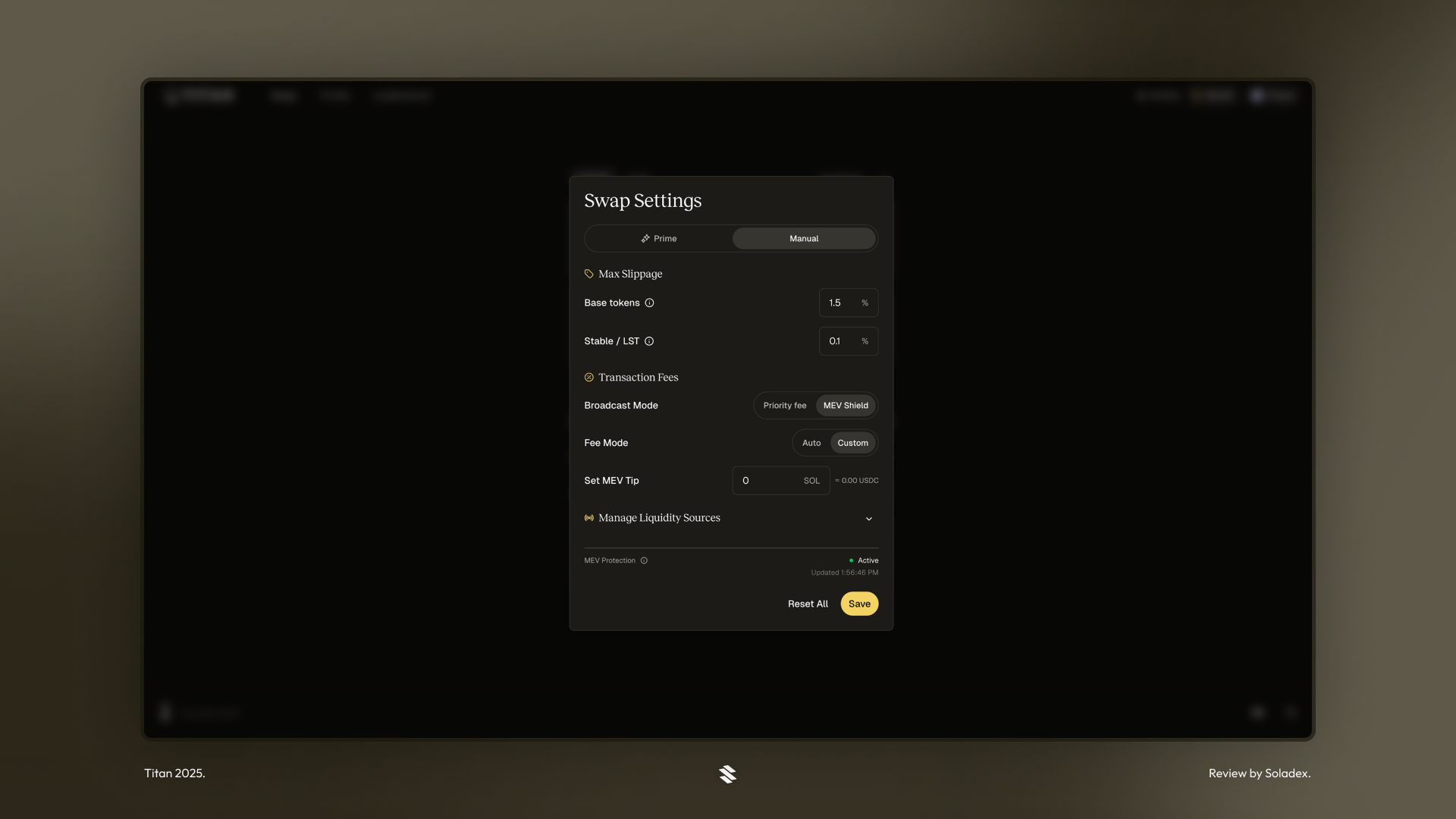
Trading Analytics
Titan provides an analytics layer for its traders. After trading, users will see transaction information like:
- Total Trading Edge: the combined benefit of Titan’s price and fee optimization
- Fee Savings: the difference in fees compared to other swap routes
- Outperformance: the dollar value gained by using Titan versus other aggregators
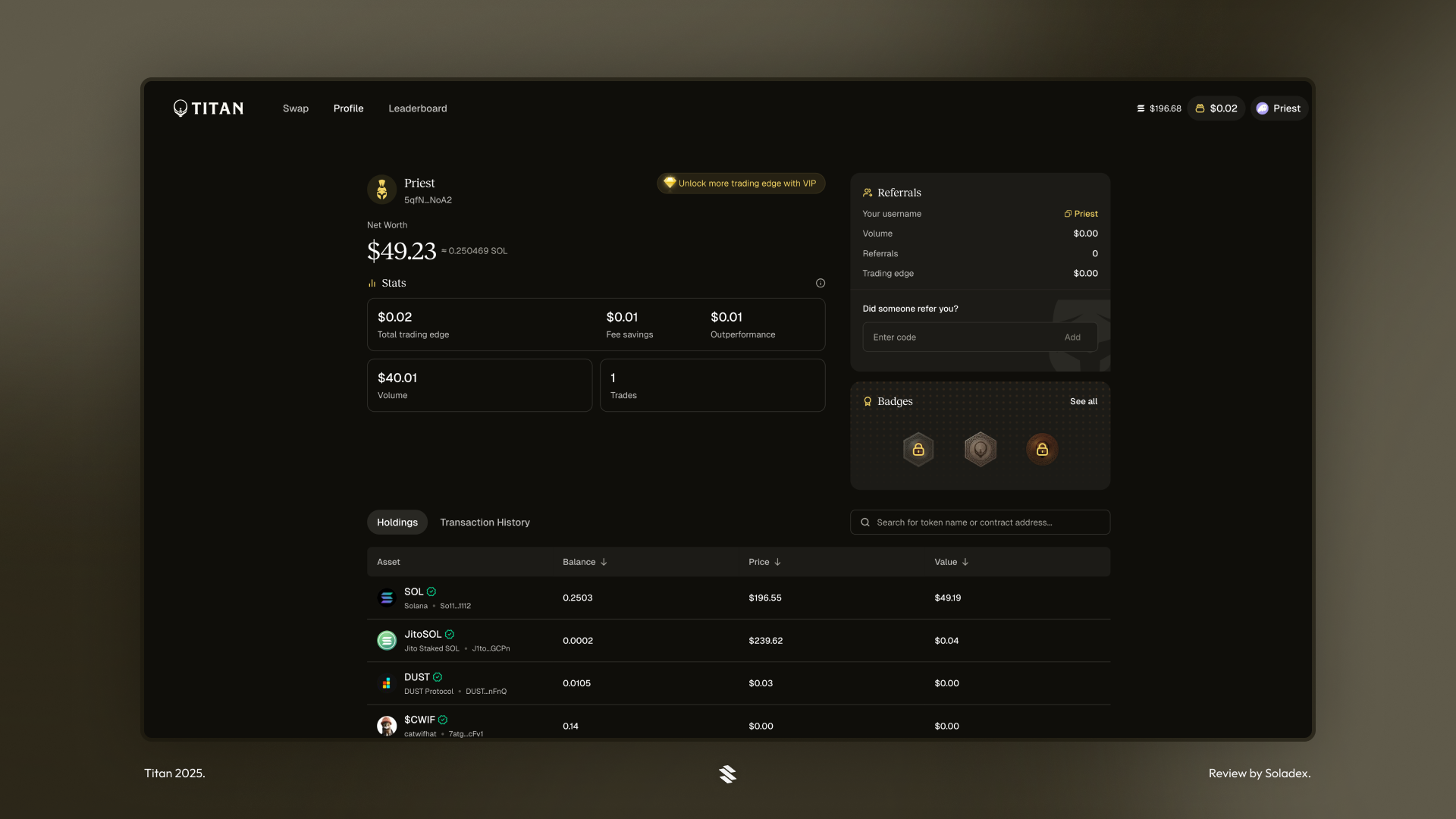
Users can also track their position on the trading leaderboard, total trading volume, number of trades, and referral performance once they’ve invited others.
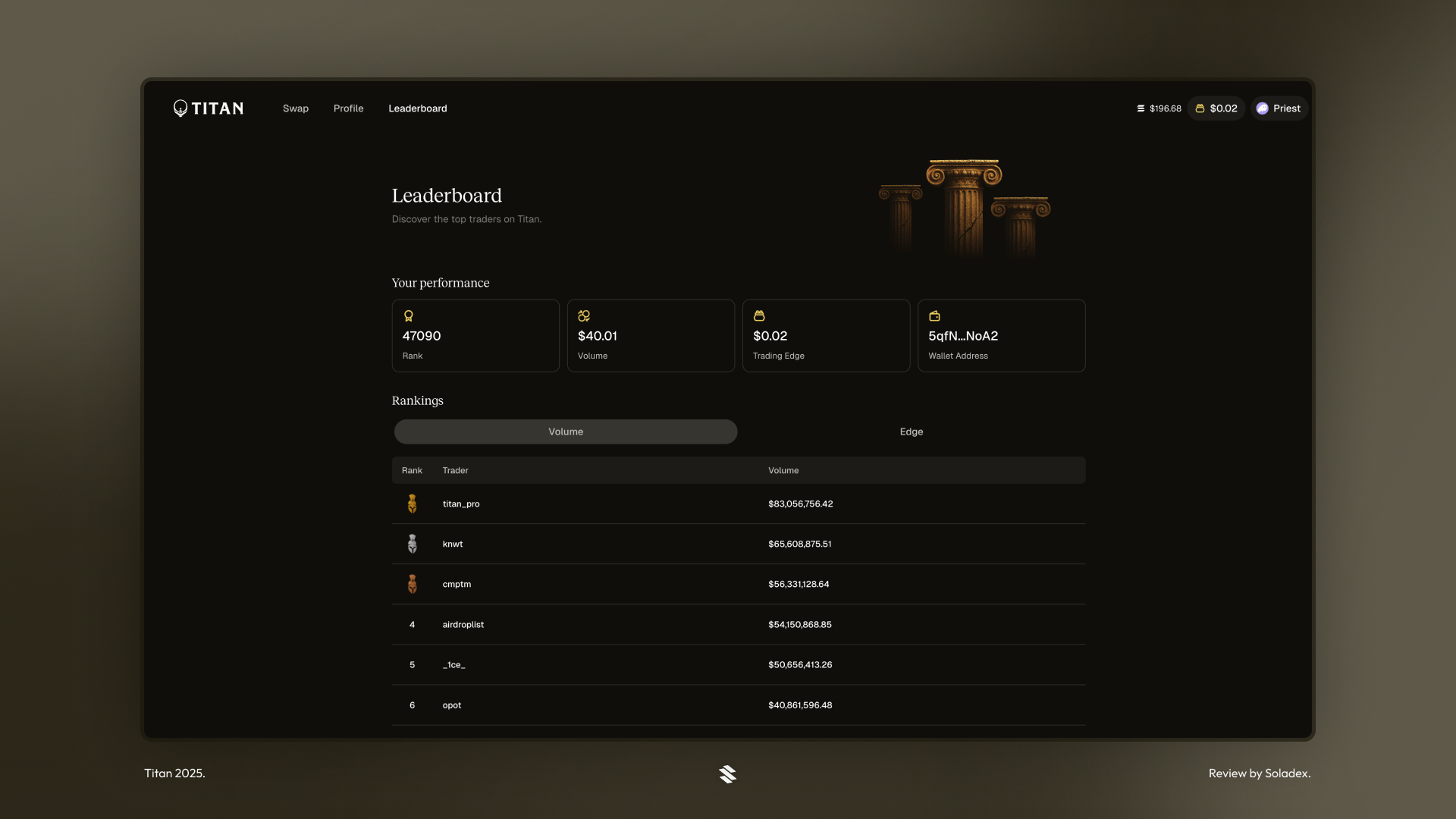
Titan Prime API For Developers
For Solana applications that need the trading platform in their own product, Titan has a service called the Prime API that developers can use to access the trading tool. By plugging into Titan’s Prime API, protocols can get the best prices with zero fee and apply the service in their own applications. Developers get access to all the capability of Titan and even premium features that can make the experience of the product better. Sign up for the Prime API waitlist here.
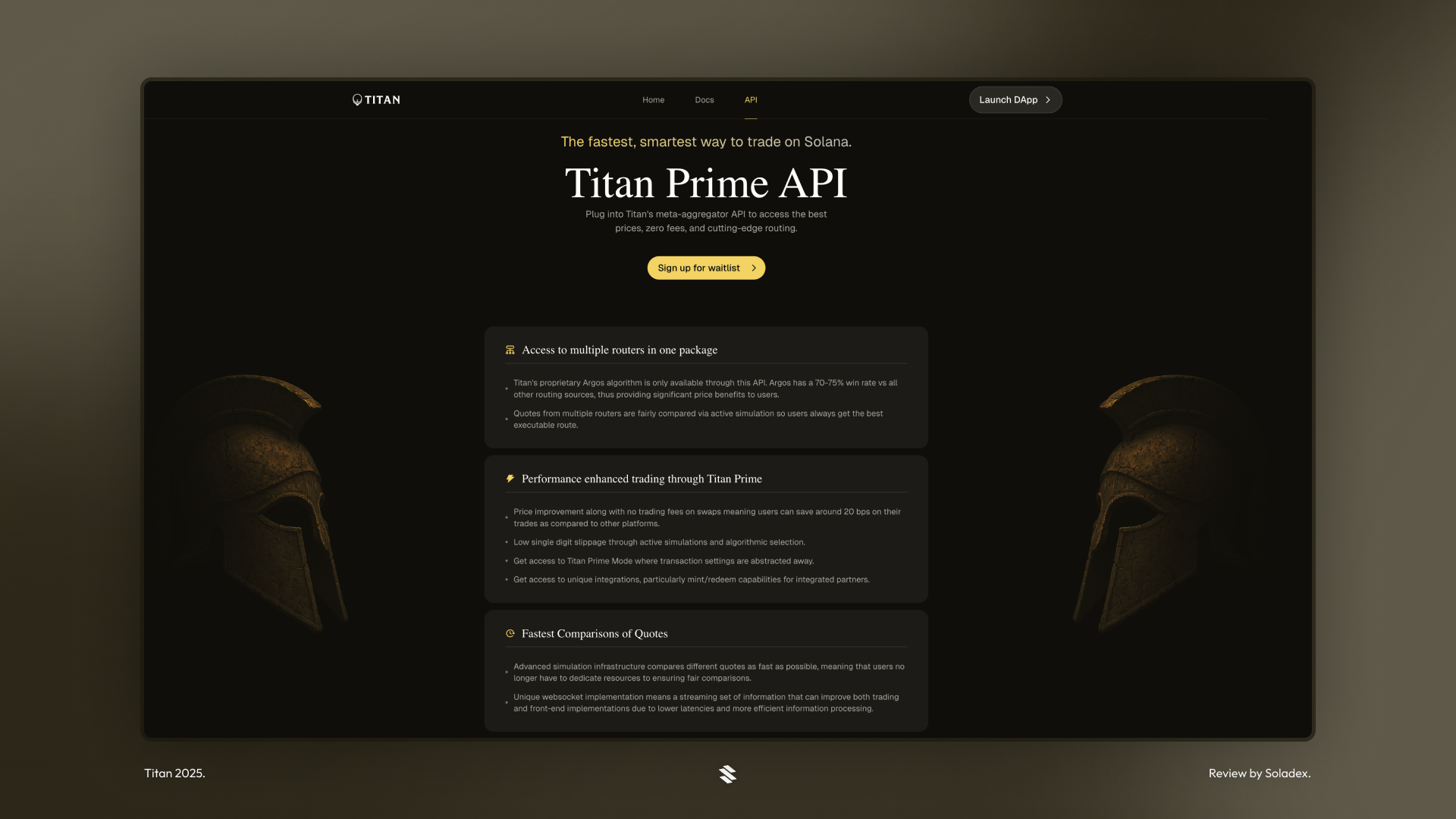
Conclusion
Titan Exchange is more than a DEX aggregator. It is a meta-aggregation protocol designed for DeFi traders, combining multiple aggregators with its unique optimization algorithm. Titan positions itself as the “broker of brokers” on the Solana blockchain. The result of this engineering effort is a reduction of value lost to inefficient routing and slippage.





